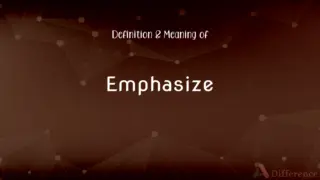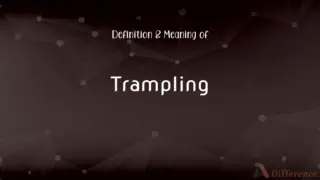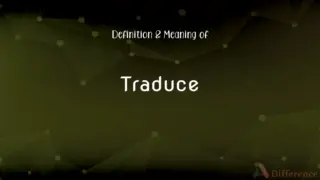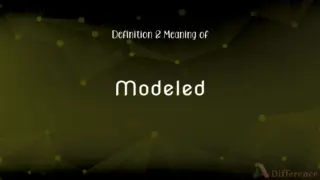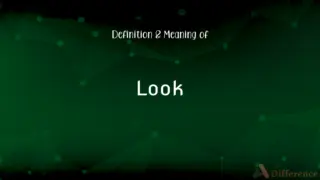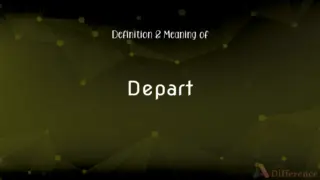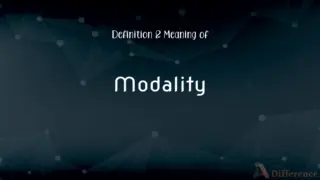Dogma Definition and Meaning
Edited by Tayyaba Rehman — By Maham Liaqat — Updated on March 5, 2024
Dogma means a set of principles or beliefs that are accepted by the members of a group without being questioned or doubted. e.g., The scientist challenged the dogma that had dominated the field for decades.
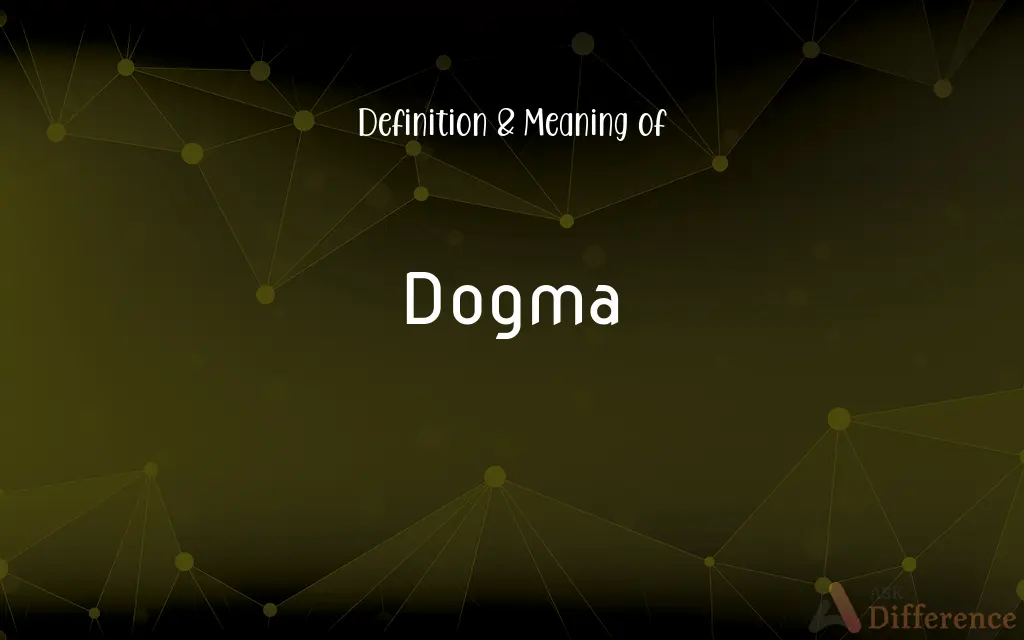
Table of Contents
Dogma Definitions
Religious Doctrine: A principle or set of principles laid down by an authority as incontrovertibly true.
The church's dogma was followed by all its members.
Authoritative Belief: A belief or set of beliefs that are accepted by the members of a group as absolutely true.
The political party's dogma shaped its policies.
Immutable Truths: Beliefs considered to be unchangeable and permanent truths.
The dogma of her philosophy remained unchanged through the years.
Unquestioned Principles: Principles or beliefs that are not to be disputed or questioned.
The dogma of the cult discouraged any form of dissent.
Rigid Beliefs: Beliefs that are strict and not subject to change or adaptation.
The society's dogma left no room for modern interpretations.
Orthodox Teachings: Teachings that conform to the established or traditional rules of a faith.
The orthodox dogma of the church was upheld at the council.
Canonical Beliefs: Beliefs that are officially recognized and sanctioned by religious authority.
The canonical dogma was included in the religious texts.
Core Tenets: The fundamental beliefs that form the foundation of a system of thought or beliefs.
The dogma of non-violence guided their activism.
Ideological Dogma: A system of beliefs or doctrines that are propagated by an organization or movement.
The revolutionary's writings became the dogma for the movement.
Fundamental Doctrines: Basic doctrines that are central to a belief system.
The dogma of freedom and equality was central to their constitution.
A doctrine or a corpus of doctrines relating to matters such as morality and faith, set forth in an authoritative manner by a religion.
A principle or statement of ideas, or a group of such principles or statements, especially when considered to be authoritative or accepted uncritically
"Much education consists in the instilling of unfounded dogmas in place of a spirit of inquiry" (Bertrand Russell).
An authoritative principle, belief or statement of opinion, especially one considered to be absolutely true and indisputable, regardless of evidence or without evidence to support it.
A doctrine (or set of doctrines) relating to matters such as morality and faith, set forth authoritatively by a religious organization or leader.
In the Catholic Church, new dogmas can only be declared by the pope after the extremely rare procedure ex cathedra to make them part of the official faith.
That which is held as an opinion; a tenet; a doctrine.
The obscure and loose dogmas of early antiquity.
A formally stated and authoritatively settled doctrine; a definite, established, and authoritative tenet.
A doctrinal notion asserted without regard to evidence or truth; an arbitrary dictum.
A religious doctrine that is proclaimed as true without proof
A doctrine or code of beliefs accepted as authoritative;
He believed all the Marxist dogma
Dogma Snonyms
Belief
Something one accepts as true or real; a firmly held opinion.
His belief in democracy was unshakeable.
Tenet
A principle or belief, especially one of the main principles of a religion or philosophy.
Non-violence is a tenet of some religions.
Principle
A fundamental truth or proposition that serves as the foundation for a system of belief or behavior.
The basic principles of justice.
Doctrine
A belief or set of beliefs held and taught by a church, political party, or other group.
The doctrine of free will is central to many religions.
Creed
A set of beliefs or aims that guide someone's actions.
The party's creed focuses on social justice.
Canon
A general law, rule, principle, or criterion by which something is judged.
The canons of good taste.
Precept
A general rule intended to regulate behavior or thought.
Moral precepts guide his life.
Conviction
A firmly held belief or opinion.
She spoke with conviction about her faith.
Credo
A statement of the beliefs or aims that guide someone's actions.
The company's credo is customer first.
Orthodoxy
Authorized or generally accepted theory, doctrine, or practice.
The orthodoxy of his views on history.
Dogma Idioms & Phrases
Dogma's grip
The strong hold or influence that a particular belief system has on an individual or society.
The artist sought to escape the dogma's grip that society imposed on creative expression.
Dogma in disguise
A belief or principle that is presented as new or revolutionary but is actually an old doctrine in a new form.
Some see the latest educational reforms as dogma in disguise.
Challenging the dogma
Questioning or disputing established beliefs or doctrines.
Her research is challenging the dogma surrounding traditional medicine.
Beyond dogma
Thinking or existing outside of traditional beliefs or established doctrines.
His approach to spirituality is beyond dogma, blending multiple philosophies.
Dogma-driven
Motivated or guided by a specific set of beliefs or principles.
The organization's dogma-driven agenda sparked controversy.
Diluting the dogma
Making a belief system less rigid or absolute by incorporating different perspectives.
The leader sought to dilute the dogma to make the philosophy more inclusive.
Under the shadow of dogma
Living or operating in an environment where beliefs or principles are imposed without question.
Growing up under the shadow of dogma, he yearned for intellectual freedom.
Break free from dogma
To liberate oneself from rigid beliefs or doctrines.
The new generation of thinkers is trying to break free from dogma.
The walls of dogma
The limitations or barriers created by rigid adherence to certain doctrines.
Innovators often find themselves hitting the walls of dogma.
Dogma at the doorstep
The introduction or imposition of a set of beliefs upon entering a new environment or phase of life.
Upon joining the organization, he encountered dogma at the doorstep.
Dogma's dawn
The emergence or establishment of a new set of principles or beliefs.
The revolution marked dogma's dawn, with new ideologies taking root.
The fabric of dogma
The underlying structure or framework of a belief system that shapes an individual's or society's worldview.
He sought to understand the fabric of dogma that influenced ancient civilizations.
Dogma's double edge
The idea that while belief systems can provide structure and meaning, they can also restrict and divide.
The documentary explores dogma's double edge, highlighting both its comforts and perils.
Shedding dogma
The process of letting go of outdated or restrictive beliefs.
The community is slowly shedding dogma and embracing more progressive values.
Escape dogma's clutches
To overcome or move beyond the restrictive influence of a particular belief system.
The writer's journey was one of escaping dogma's clutches and finding her own voice.
Dogma's dissolution
The process of a belief system breaking down or being abandoned.
The philosopher's writings contributed to dogma's dissolution, encouraging free thought.
Dogma's disciple
A follower or proponent of a particular doctrine or belief system.
As a dogma's disciple, he could not accept any criticism of his beliefs.
Dogma's echo
The repetition or propagation of beliefs without questioning their validity.
The debate was filled with dogma's echo, with no original thought.
Navigating through dogma
The process of finding one's way in a world dominated by rigid beliefs.
Her book is a guide for navigating through dogma and discovering personal truth.
The fortress of dogma
A metaphor for a belief system that is heavily defended against criticism or change.
His mind was a fortress of dogma, impervious to new ideas.
Dogma Example Sentences
He questioned the dogma that everyone else accepted without doubt.
They debated the dogma behind modern economic theories.
His research offered an alternative to the prevailing dogma.
The teacher explained the dogma of the ancient philosophers.
They founded the organization on the dogma of social justice.
Her book challenges the traditional dogma in her field of study.
The new findings contradicted the old scientific dogma.
The documentary explored the dogma of different cultures.
She grew up surrounded by the dogma of her community.
His writings questioned the dogma of his time.
The conference discussed the evolution of dogma in society.
She sought to understand the dogma that influenced historical events.
The class studied the dogma of various political ideologies.
The lecture provided insight into the dogma of medieval Europe.
The poet's work subtly critiqued the dogma of her era.
Common Curiosities
How is dogma used in a sentence?
The core dogma of the organization dictates a strict adherence to non-violence.
How do we divide dogma into syllables?
"Dogma" is divided into syllables as "dog-ma."
Why is it called dogma?
"Dogma" is called so because it refers to a principle or set of principles laid down by an authority as incontrovertibly true. The term originates from the Greek "dogma" meaning "that which one thinks is true," and from "dokein" meaning "to seem good," "think."
How many syllables are in dogma?
There are two syllables in "dogma."
What is a stressed syllable in dogma?
The stressed syllable in "dogma" is the first syllable, "dog."
What is another term for dogma?
Another term for "dogma" could be "doctrine" or "creed."
What is the verb form of dogma?
"Dogma" is a noun and does not have a direct verb form. The related verb might be "dogmatize," meaning to assert or lay down as a dogma.
What is the pronunciation of dogma?
"Dogma" is pronounced as /ˈdɔɡmə/ in American English.
Is dogma a noun or adjective?
"Dogma" is a noun.
What is the root word of dogma?
The root word of "dogma" is the Greek "dogma," meaning "that which one thinks is true."
Is dogma a collective noun?
No, "dogma" is not typically used as a collective noun.
Is the dogma term a metaphor?
"Dogma" can be used metaphorically to describe any set of rigid principles or beliefs in various contexts.
Is the word dogma Gerund?
No, "dogma" is not a gerund. It remains a noun and does not have a verb form that would allow for a gerund.
Which determiner is used with dogma?
Determiners such as "the," "a," "this," "that," "my," "your" can be used with "dogma," depending on the context.
What is the singular form of dogma?
The singular form is "dogma."
What is the opposite of dogma?
The opposite of "dogma" could be "doubt" or "skepticism."
Is the word dogma imperative?
No, "dogma" as a noun does not have an imperative form.
What is the plural form of dogma?
The plural form is "dogmas" or "dogmata" (the latter being less common but used in more formal or academic contexts).
Is dogma an adverb?
No, "dogma" is not an adverb.
Is dogma an abstract noun?
Yes, "dogma" is an abstract noun as it refers to a belief or set of beliefs.
What part of speech is dogma?
"Dogma" is a noun.
Is dogma a negative or positive word?
"Dogma" is neutral, but it can have a negative connotation when used to describe rigid or inflexible beliefs.
Is dogma a vowel or consonant?
The word "dogma" starts with a consonant sound, "d."
Is dogma a countable noun?
Yes, "dogma" is a countable noun. You can have one dogma, two dogmas, etc.
Is the word “dogma” a Direct object or an Indirect object?
"Dogma" can serve as a direct object in a sentence, such as "He challenged the dogma."
Which vowel is used before dogma?
The vowel used before "dogma" depends on the preceding word and its grammatical structure, not on "dogma" itself.
Share Your Discovery

Previous Term
Convect Definition and Meaning
Next Term
Convey Definition and MeaningAuthor Spotlight
Written by
Maham LiaqatEdited by
Tayyaba RehmanTayyaba Rehman is a distinguished writer, currently serving as a primary contributor to askdifference.com. As a researcher in semantics and etymology, Tayyaba's passion for the complexity of languages and their distinctions has found a perfect home on the platform. Tayyaba delves into the intricacies of language, distinguishing between commonly confused words and phrases, thereby providing clarity for readers worldwide.







